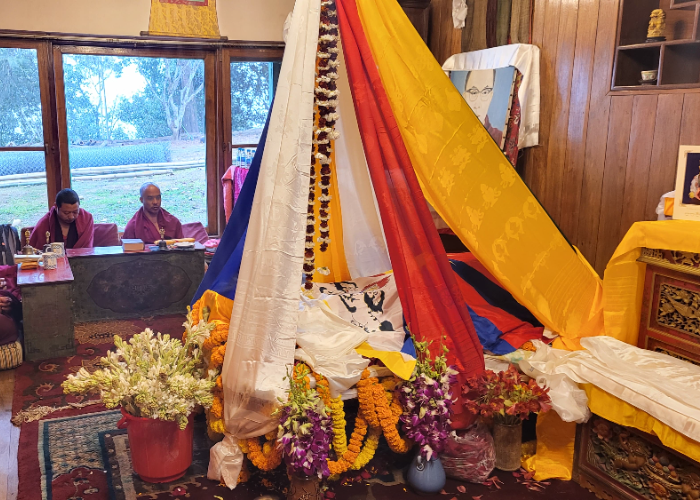Yowan Mothay
Kalimpong, 9 February
Gyalo Thondup, the elder brother of the 14th Dalai Lama, passed away in Kalimpong on Saturday, February 8. He was 97.
As soon as news spread of his demise, various organizations and societies in Kalimpong gathered at his residence at Eighth Mile, while dignitaries, including Thondup's sister and family members, have arrived in Kalimpong from Dharamshala in Himachal Pradesh, where the seat of the Tibetan Government-in-exile is located.
Prayer services are being held at Thondup’s home in Kalimpong, and people are pouring in from Dharamshala.
His funeral will be performed in Kalimpong on Tuesday, February 11, family sources said.
Born in 1928 in the Amdo region of Tibet, Thondup is a prominent figure in Tibetan history. As a leading political strategist, he played an important role in the Tibetan movement, working tirelessly to gain international support for the Tibetan cause. He dedicated his life to the struggle of the Tibetan people.
In 1939, Thondup reached Lhasa with his family, and at the age of 14, he went to Nanjing, China, to study Standard Chinese and Chinese history, it is learnt. While in China, he became close to prominent figures, including Chiang Kai-shek. In 1948, he married Zhu Dan, the daughter of a Kuomintang general. As political tensions in China rose, he is known to have left Nanjing in 1949 and settled permanently in Kalimpong town in West Bengal in India.
“He, however, continued his work for Tibetan independence after arriving in Kalimpong. His memoir, ‘The Noodle Maker of Kalimpong,’ has become a powerful testament to the struggle for Tibetan identity and justice,” a family source said. The book focuses on the political struggle in Tibet and his involvement and internal perspective in it, while it became an international bestseller.
Thondup played a decisive role in the political landscape of Tibet throughout his life, as evidenced by his engagement with global leaders in advocating for Tibetan autonomy.
Fluent in Chinese, Tibetan, and English, Gyalo Thondup facilitated semi-official contacts between the Tibetan government-in-exile and both the Republic of China (Taiwan) and the People's Republic of China, those in the know say.
Notably, with the Dalai Lama's permission, Thondup met Chinese leader Deng Xiaoping in 1979 to begin an open political dialogue. In the 1990s, he is known to have made several official visits to China, serving as the Dalai Lama's unofficial envoy.
Gyalo Thondup was also an entrepreneur. In the 1960s, he established a noodle factory in Kalimpong, which became an important part of his life.
Expressing deep sorrow over his death, various Tibetan community societies, organizations, and individuals in Kalimpong expressed their condolences, saying that Tibet had lost a true guardian of its history and hope, and that Kalimpong had lost a prominent citizen.
“Thondup's contribution and commitment to Tibet's political journey will always be remembered and respected by everyone,” said Chungda Bhutia, the President of the Regional Tibetan Women's Association in Kalimpong.










Leave a Comment